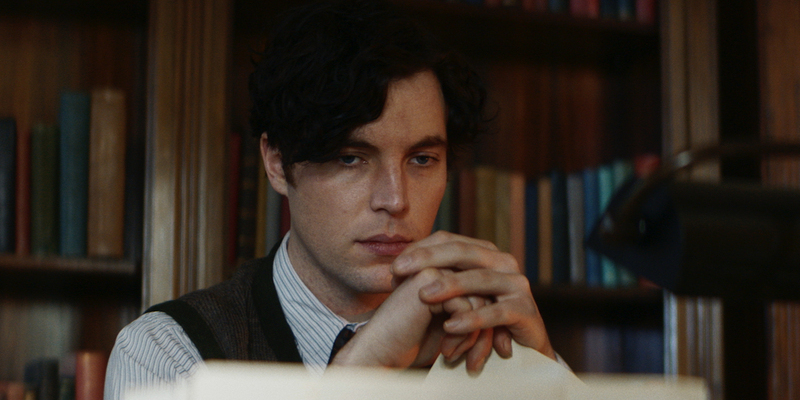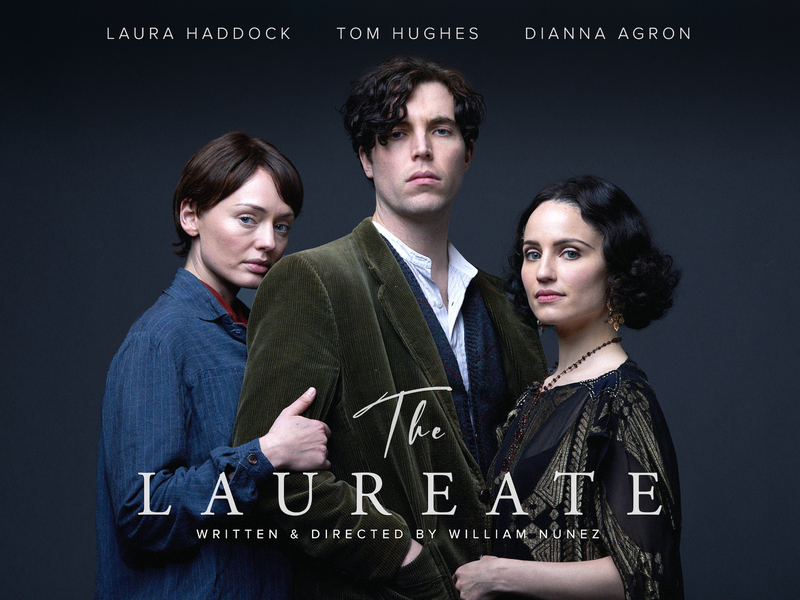
Poet Robert Graves and his wife Nancy Nicholson enter an unconventional
relationship with American poet Laura Riding.
Review by
Eric Hillis
Directed by: William Nunez
Starring: Tom Hughes, Dianna Agron, Laura Haddock, Indica
Watson, Fra Fee

Unless they're made by Terence Davies (A Quiet Passion;
Benediction), movies about poets aren't usually very entertaining. Observing
rather than participating in life, poets, like most writers, tend not to
lead the most interesting lives. That can't be said of English poet
Robert Graves, who indulged his love of women throughout his life, even
living in a ménage á trois with his wife and another woman for several
years. Writer/director William Nunez hones in on this saucy
period of Graves' life for The Laureate, a b-movie cousin of Philip Kaufman's
Henry & June.

Fealty to Graves' actual life, or at least as it's popularly
documented, is thrown out the window from the off, with this version of
Graves (Tom Hughes) struggling for inspiration in the mid-1920s,
a time when he was actually quite prolific. He's living in the ominously
named "World's End" cottage with his wife, the illustrator Nancy
Nicholson (Laura Haddock), and their young daughter Catherine (Indica Watson), with three of the couple's real life children excised for narrative
streamlining here. Contrary to the word of literary historians, who
claim Nicholson had no time to indulge Graves' PTSD and banned all
mention of the war from their relationship, here she's an ultra
supportive wife who bends over backwards to support Graves and his work.
Graves is something of a kept man in this version, with Hughes often
playing the poet as though he's heavily sedated. Graves was famously a
bit of a sex addict, something else his wife refused to indulge, but
here he's portrayed as a prude who fails to satisfy Nicholson's
desires.
Graves' creative passion, along with his libido, is roused by the
entrance of American poet Laura Riding (Dianna Agron), whom he
invites to live at World's End after being won over by her ideas on the
path forward for poetry. Riding immediately begins flirting with her
fellow poet, even inviting him to join her for a bath as he stutters and
shuffles like a '90s Hugh Grant. Unable to get her hands on Graves,
Riding switches her attention to Nicholson, who quickly succumbs to her
seduction. Seeing how Riding has inspired Graves, Nicholson asks her to
seduce her husband, and after several attempts she finally succeeds in
bedding him.

In reality the three lived in Egypt, but presumably for budgetary
reasons this version keeps them in the grounds of World's End. The
threesome works well initially and for a while
The Laureate might be mistaken for a progressive take on
unconventional relationships in the manner of
Professor Marston and the Wonder Women. There's a lovely scene in which the three lovers and Catherine are
quietly going about their respective business in their living room. With
Graves and Riding composing poems, Nicholson drawing and Catherine
wrapped up in a book, it's the very picture of familial bliss, if far
from the traditional idea of such a thing. But of course, humans being
the way they are, jealousy soon tears the three apart, with Nicholson
beginning to feel like an intellectual spare tyre.
If Riding is initially portrayed as a Mary Poppins figure who comes
into the life of the troubled Graves at just the right moment, it's not
long before she reveals herself as something closer to Cruella de Vil.
Agron plays the part with the sneer of a Disney villain, and the movie's
second half adopts a very conservative scorn towards the poetess. The
liberated feminist we meet at first morphs into the antagonist of an
erotic thriller as she absconds to London with Graves and takes another
lover in a young aspiring Irish poet (Fra Fee).
The Laureate flirts with fully embracing TV movie thriller
tropes in a scene where Riding almost goads Catherine into leaping from
a second storey window.

If you're a fan of any of the artists portrayed here you'll probably
spend much of The Laureate's running time rolling your eyes. It's more interested in being a
trashy erotic drama (albeit one with a curious lack of nudity) than an
insightful look at a period in a poet's life. That said, as trashy
erotic dramas go, it's rarely dull. Agron's audition to play the
villainess of whatever classic animation Disney decides to dust off for
their next live action reboot is enough to recommend
The Laureate to less discerning viewers. Ever since her
breakout on TV's Glee, Agron has been cast in girl next door roles, so it's refreshing to
see her get the chance to vamp it up as a wicked witch, though fans of
the real life Riding may not see it that way.


